 Editor’s Note: Jeanette Henderson, a member of Sightline’s board of directors, read this 2009 post on junk mail, and started noticing the way phone books pile up in her Seattle neighborhood of Queen Anne. She recounted the story at a recent Sightline gathering, and we thought it worth publishing.
Editor’s Note: Jeanette Henderson, a member of Sightline’s board of directors, read this 2009 post on junk mail, and started noticing the way phone books pile up in her Seattle neighborhood of Queen Anne. She recounted the story at a recent Sightline gathering, and we thought it worth publishing.
 Phone books piled in doorways caught my attention while walking in my neighborhood one January weekend. Verizon yellow pages phone books, two per plastic bag, had recently been delivered to my own front porch.
Phone books piled in doorways caught my attention while walking in my neighborhood one January weekend. Verizon yellow pages phone books, two per plastic bag, had recently been delivered to my own front porch.
This scene repeated itself over and over as I walked along the street. Phone books left in front of doors. Where several units shared a single locked entry, they were piled high.
Almost everywhere I looked, there was one bag of phone books for each apartment or condo. Ground-floor shops and small businesses, meanwhile, typically got two bags.


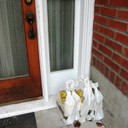

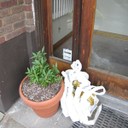


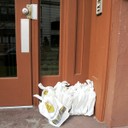
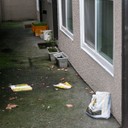
Did anyone want all these phone books?
I began asking residents and building managers. I spoke with eight people that morning. Only one in eight appreciated the books, telling me, “They’re recyclable. The people who deliver them need jobs. Some people are not in computer age.”
The other seven said:
- “I always have to recycle a lot of them.”
- “I have been the resident manager for three years, and I recycle all of them every time. No tenants want them. I’ve tried calling in the past to get them to stop, but they keep coming.”
- “About 1 out of 10 is wanted, the rest just sit there until someone gets rid of them.”
- “No one wants them.”
- “I use mine to prop up my computer.”
- “Don’t want them. That’s what the internet is for.”
- “I only keep one and throw out the rest.”

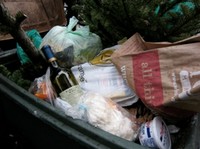
Opt Out?
 Not a single resident or building manager I spoke with knew how to—or that they could—opt out of getting phone books delivered. I opened a Verizon bag with one of the building managers and looked for the information. We found it in very small print on the cover, as shown at the right.
Not a single resident or building manager I spoke with knew how to—or that they could—opt out of getting phone books delivered. I opened a Verizon bag with one of the building managers and looked for the information. We found it in very small print on the cover, as shown at the right.
During my quick visual survey in my neighborhood, I counted 61 bags of phone books piled at nine buildings with a total of 66 units. I’d been told the phone books had arrived two or three days earlier, so the other five bags of phone books may have been claimed by residents. Or they may have been trashed already. At a minimum, 92 percent appeared to be unwanted.
Opt In?
Zero Waste Seattle, a grassroots citizens group has recently decided it’s time to do something about all this waste, as part of a larger waste reduction strategy in the city. They are pushing the City Council to adopt an Opt In ordinance, so that the phone book companies will be allowed to deliver only to the people who want the books. Opt In means people choose which phone books they want to receive. City Councilmember Mike O’Brien has been a champion for this effort, as reported in this local news clip and this Stranger article.
Phone book companies will likely fight this proposal, as they have in many other cities and states. The phone book companies will claim that their voluntary Opt Out program is the best solution because it’s only a small minority of people who don’t want paper phone books. They say that most people want phone books and that the program should be designed for the majority.
To their credit, phone book publishers’ Opt Out website has improved recently. Just enter your zip code and you’ll find all the companies that deliver to your neighborhood. From there, though, you’ll still have to follow the specific Opt Out instructions for each company. In Seattle, that means contacting four different companies.
Besides, Opt Out is optional for the phone companies. I opted out of phone books about three years ago, but the phone books keep coming. Once, I happened to be at home when I heard the thud of books landing on my front porch. I hurried outside and asked the delivery man to take back the books. What he told me was a symptom of why Opt Out has not worked: he said that following an opt-out list takes too long. It’s simpler to deliver to everyone, so that’s what he was doing.
There’s no penalty for delivering to people who don’t want phone books, so there’s no incentive for phone book companies to enforce Opt Out. Plus, many people don’t know about Opt Out, or don’t take the time sign up.
For all these reasons, an Opt In ordinance makes more sense.
Phone books are not the biggest pollution or waste problem we face, I’ll be the first to admit. But they are still an enormous waste of resources—if most people, like those in my neighborhood, don’t want them.
Photos: All photos by Jeanette Henderson. Used by permission.









Alan Durning
The Seattle Times covered this issue today. An interesting development: “Council President Richard Conlin said he wants to move eventually toward an opt-in program, where residents who wanted a phone book would have to sign up for one.”In the meantime, he wants to see whether the city can charge phone-book publishers between 25 and 50 cents per book to cover recycling costs for the more than 550,000 books distributed each year in Seattle.”
Matt the Engineer
I’m curious if they even pay attention to the opt-out list, or if they deliver to absolutely everyone. Using myself as a case study, I don’t have a traditional phone service (I use a VoIP) and therefore shouldn’t get a phone book. In reality I get 2-3 a year from different companies, who all likely just dump them off at every single house. Last year I actually caught the guy, and ran down the street to give the phone book back to him.
J
I have struggled over the past two years to get the companies to pay attention to their “opt-out” lists. It’s hit-or-miss. I think one big problem is there’s no consequence to the company when they ignore the list (they say it’s their contractors, and refuse to pick up mis-delivered books.) Opt-in is preferable.
Bob
Newspapers and flyers are much worse. A never ending daily and weekly stream of these items land on my front porch or my mailbox. I think that if one was to keep all those flyers and advertising newspapers, one would see a stack of paper 100 times larger than a couple of yellow page books which have more value. Sure renters in condos and apartments may not need them because they don’t need to maintain their condos. Homeownere in the burbs still like to receive these books.
Eric Hess
Hi Bob—Funny you should mention that. Alan once collected all his junk mail for a whole year. He cataloged his collection here. Phone books were by far the heaviest culprits, weighing 15 lbs of the total 50 lbs of mail.
charlie
We see it here in Portland too, of course. I’ve often wondered how it’s not littering… deliveries should be in the mail or to a particular person (as in a FedEx or UPS package), or else it’s littering. Isn’t it? If that’s the case, there should be serious downside for delivering unwanted paper. Any lawyers out there?
xathras
I, too, have opted out yet get a minimum of 4 sets of yellow pages every year. I call the companies and demand they send someone around to pick up the litter they dumped on my property. This usually works within a week. As for the advertising newspapers, a strongly worded cease and desist nasty-gram gets rid of them for a while, until a new delivery person comes on the job, than a refresher nasty-gram has served to get rid of them again.
Chris
Phone book companies certainly are the kings of garbage when it comes to delivering their message. Unwanted phone books are bigger forms of “door tagging” (companies who put their advertising on your door). All of it is considered “nuisance littering”, which is illegal in most cities. Appreciate the efforts to stop the entities who are putting dead trees on my door step!